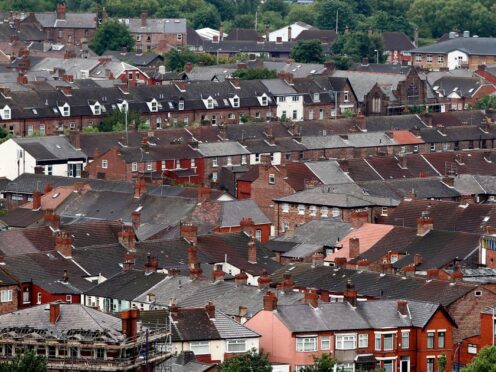
The UK’s “expensive, cramped and ageing” housing stock fares poorly compared with other advanced countries, analysis by a think tank suggests.
Households are paying more than other countries – but getting less in return, the Resolution Foundation said.
Its report said: “When it comes to housing, UK households are getting an inferior product in terms of both quantity and quality.”
The Foundation’s housing outlook used OCED data to compare the UK’s housing issues against other similar economies.
It said that while there is “limited cross-national data” on floorspace, homes in England have less average floorspace per person (38 m2) than many similar countries, including the United States (66 m2), Germany (46 m2), France (43 m2) and Japan (40 m2).
The UK’s housing stock is also relatively old, with 38% of homes built before 1946, the report said, compared with around a fifth (21%) in Italy and one in nine (11%) in Spain.
Older homes can be poorly insulated, leading to higher energy bills and a higher risk of damp, according to the Foundation, which is focused on improving the living standards for those on low to middle incomes.
Researchers also considered what it would cost to rent all homes – incorporating what owners would pay if they rented their home at market rates – to show how the market price of housing varies across different countries.
The report said: “If all households in the UK were fully exposed to our housing market, they would have to devote 22% of their spending to housing services, far higher than the OECD average (17%), and the highest level across the developed economies with the solitary exception of Finland.”
Adam Corlett, principal economist at the Resolution Foundation, said: “Britain’s housing crisis is likely to be a big topic in the election campaign, as parties debate how to address the problems of high costs, poor quality and low security that face so many households.
“Britain is one of many countries apparently in the midst of a housing crisis, and it can be difficult to separate rhetoric from reality. But by looking at housing costs, floorspace and wider issues of quality, we find that the UK’s expensive, cramped and ageing housing stock offers the worst value for money of any advanced economy.
“Britain’s housing crisis is decades in the making, with successive governments failing to build enough new homes and modernise our existing stock. That now has to change.”
A Department for Levelling Up, Housing and Communities spokesperson said: “Housebuilding is a Government priority and despite global economic challenges we remain on track to meet the manifesto commitment of delivering one million homes this Parliament, and have introduced reforms to improve the planning system.
“At the same time as increasing the quantity of homes we are driving up quality, with the number of non-decent homes down by two million since 2010.
“Our landmark Renters Reform Bill is progressing through Parliament and will give tenants more security in their homes, while our £11.5 billion investment in the affordable homes Programme and £1.2 billion local authority housing fund will help build a new generation of affordable and social housing.”

Enjoy the convenience of having The Sunday Post delivered as a digital ePaper straight to your smartphone, tablet or computer.
Subscribe for only £5.49 a month and enjoy all the benefits of the printed paper as a digital replica.
Subscribe